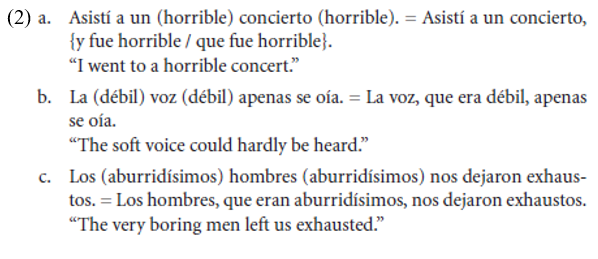


 Grammar
Grammar
 Tenses
Tenses
 Present
Present
 Past
Past
 Future
Future
 Parts Of Speech
Parts Of Speech
 Nouns
Nouns
 Verbs
Verbs
 Adverbs
Adverbs
 Adjectives
Adjectives
 Pronouns
Pronouns
 Pre Position
Pre Position
 Preposition by function
Preposition by function 
 Preposition by construction
Preposition by construction
 Conjunctions
Conjunctions
 Interjections
Interjections
 Grammar Rules
Grammar Rules
 Linguistics
Linguistics
 Semantics
Semantics
 Pragmatics
Pragmatics
 Reading Comprehension
Reading Comprehension|
Read More
Date: 2024-01-10
Date: 2024-01-16
Date: 2023-12-09
|
Expressing an extreme property (d)
In (16) we have the logical type of what I call “extreme degree adjectives: certain of Dixon’s human disposition adjectives (horrible ‘horrible,’ necio ‘stupid,’ espantoso ‘awful’) and qualitative superlative adjectives (maravilloso ‘wonderful,’ hermosísimo ‘very beautiful,’ magnífico ‘magnificent’) correspond to this type.1 Considering their function we may call them “appositive” because they serve to express a distinctive or central property of N, as if it were added as a supplement to its denotation.

My assertion is that these adjectives are predicative nonrestrictive modifiers, different in this sense from the three preceding types. This is so because in all syntactic contexts in which they occur they do not refer to a subset of the class of objects denoted by N. Moreover, they can be paraphrased as parenthetical or as nonrestrictive relatives. The examples in (1) can be paraphrased as in (2):

Superlative nonrestrictive adjectives like maravillosos in sus/los maravillosos sombreros are usually prenominal in definite expressions; #Sus sombreros maravillosos is less frequent. The reason is that, by default, superlative evaluative adjectives do not serve to delimit a subset of objects; they cannot classify objects in the world since they express not objective properties but rather subjective evaluations. Note that the DP los sombreros maravillosos (where the superlative adjective is postnominal) is acceptable especially when it refers to a set of hats that has not previously been mentioned. In my view, these adjectives fall under the subsidiary generalization I established in the first section: there are semantic and pragmatic reasons which sometimes cause the shifting from the expected R to an NR interpretation when these adjectives are found in postnominal position. I will come back to these, explaining this in terms of focalization as external predicates to the right of NP.
Summarizing, the adjectives in the first three subgroups, from (a) to (c), can be argued to form a single group from a semantic and syntactic point of view. This unification is supported by the assumption that they scope over subparts of the meaning of N, a question to which I will return briefly later on. In contrast to the three subgroups just mentioned, postnominal adjectives (as in 3) normally modify “the individuals determined by all the properties of N” (Bouchard 1998: 143).

Briefly summarizing what we have seen up to this point: the distinction R– NR in interpretation correlates with syntactic position in two senses. First, a reduced set of adjectives are assigned either a restrictive or a nonrestrictive interpretation depending on their position (pobre, completo, simple, antiguo, etc.): I refer to the contrast between el pobre hombre, where the prenominal adjective means “pitiable” vs. el hombre pobre, where pobre is “not rich.” Second, most adjectives are interpreted one way or another depending on their position.
1 Knittel (2005: 193) names these “subjective comment” adjectives. She rightly asserts that these adjectives can be both prenominal and postnominal, and they can be modified by subjective adverbs like verdaderamente ‘truly’ or realmente ‘really.’
|
|
|
|
للعاملين في الليل.. حيلة صحية تجنبكم خطر هذا النوع من العمل
|
|
|
|
|
|
|
"ناسا" تحتفي برائد الفضاء السوفياتي يوري غاغارين
|
|
|
|
|
|
|
بمناسبة مرور 40 يومًا على رحيله الهيأة العليا لإحياء التراث تعقد ندوة ثقافية لاستذكار العلامة المحقق السيد محمد رضا الجلالي
|
|
|